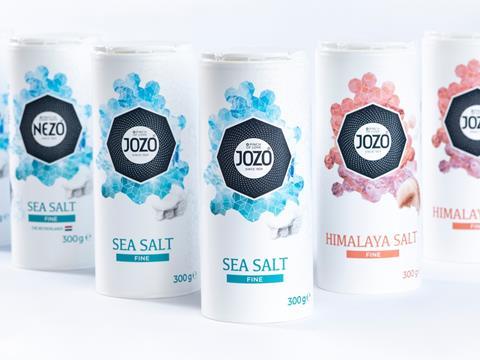
JOZO’s decorated saltshaker tubes have adopted a new, user-friendly dosage cap and MCC Verstraete’s NextCycle IML labels in collaboration with SFA Packaging, CIRCPACK, and Veolia, with the end goal being circular packs that produce high-quality recycled polypropylene.
Prior to 2021, the packaging consisted of a cardboard and aluminium tube, a polyethylene bottom, and a polyethylene and polystyrene cap. These were considered partially recyclable.
JOZO then worked alongside SFA to transition the tubes into mono-material polypropylene decorated with IML decoration, apparently achieving both shelf appeal and recyclability. Once assessed by RecyClass in October 2022, the tube received a Class B classification – meaning that, minus ‘minor recyclability issues’ that have slight impacts on the resultant recyclate, most of the components could contribute to a closed loop.
Then RecyClass’ Design for Recycling guidelines and requirements were updated in February 2023 in a bid to drive the recyclability – and, in turn, the circularity – of packaging designs. CIRCPACK and Veolia served as advisors in the development of the new tube, which is designed to be ‘future-proof’.
“Driven by JOZO’s visionary commitment to sustainable progress and true to our mission of delivering 100% recyclable and circular packaging solution, we wanted to take it one step further to live up to constantly evolving packaging regulations,” explains Alexander Heinsdijk, business development and marketing manager at SFA Packaging. “Together with MCC Verstraete and JOZO we looked at the options for further improvement. We started trials replacing standard IML labels by the NextCycle IML technology.”
According to these trials, the pack was successful in the areas of print quality, processability, and recyclability when the NextCycle IML labels were applied.
Nico Van de Walle, Product and Circular Economy manager Global IML at MCC Verstraete, continues: “As a next-generation solution for sustainable rigid PP packaging, NextCycle IML labels are uniquely designed to separate from the container during the mechanical recycling process, while staying securely fastened with no impairment to its adhesive properties during its lifecycle.
“The NextCycle IML technology allows for the packaging to enter the recycling process without the label. In this case, recycling the JOZO tubes results in white recycled material. It’s the perfect balance between recyclability and shelf appeal.”
Vincent Mooij, director of CIRCPACK by Veolia, concludes: “As we’re paving the road to a circular economy for plastic packaging, DfR guidelines and RecyClass’ classification requirements will indeed continue to grow stricter. Going mono-material was a giant step forward for JOZO’s salt shakers. Decorating the packaging with NextCycle IML labels, supports the future availability of high purity rPP.”
In a similar development, MCC Verstraete’s IML labels were recently printed with fluorescent markers from TOMRA and NEXTLOOPP – an extension of the team’s efforts to bring its PolyPPRISM sorting technology to commercial scale and recycle food-grade polypropylene.
Meanwhile, Bostik is pursuing food- and INRT-grade recycled polypropylene sourced from post-consumer packaging waste as the 50th participant in Nextek’s NEXTLOOPP project.
If you liked this article, you might also enjoy:
The L’Oréal approach to packaging sustainability
The way we talk about plastic needs to change – here’s how to get it right
What steps is Apple taking to make its packaging more sustainable?














No comments yet